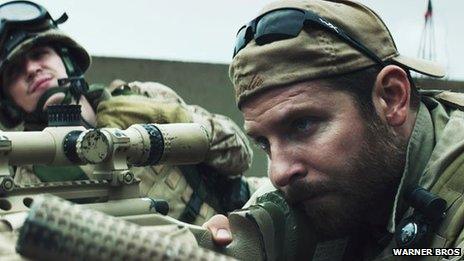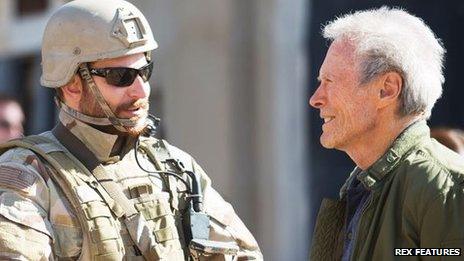Clint Eastwood goes to Iraq
- Published
Clint Eastwood: " I am always sympathetic to veterans, people who are forced to go do the job"
I was apprehensive about interviewing Clint Eastwood. Not because of his iconic status, or his reputation for being taciturn, but because I did not go a bundle on his latest film, American Sniper, a biographical film set in the Iraq war.
Based on the autobiography of US Navy Seal Chris Kyle, the story follows the military marksman played by Bradley Cooper.
Given the film was the reason for our meeting, I felt a bit awkward.
The good news was the 84-year-old director seemed happy enough when he came into the foyer of the Warner Bros cinema on the studio's lot in Hollywood.
He was casually dressed in cream coloured slacks, light blue polo shirt and a dark linen jacket.
The bad news was the running order: I was last to go in a long morning of interviews he was giving - time for him to get tired and scratchy and for me to dwell on my small social dilemma.

American Sniper follows the story of military marksman Chris Kyle, played by Bradley Cooper.
As one Japanese journalist after another went into the cinema to meet The Great Man, I whiled away the time watching a Tina Fey show being shot outside.
My cameraman told me that back in the day the LA movie studios had retractable roofs so directors could use the sun as a top light.
"Conflicts keep people wondering"
It was nearing 2pm when I got the nod indicating my turn had come.
I made my way to the interview spot in the auditorium, where - a few moments later - I was joined by Clint Eastwood. He looked good: a slow walk and slight stoop being the only obvious outward signs of old age. And his good mood was intact.
"Hello Will," he said with a broad, warm smile. "Nice to see you. Are we standing or sitting?"
"Sitting," I say. And soon he is talking about American Sniper.
"I'm not a guy who is fond of the war in Iraq or Afghanistan. But I am very sympathetic to veterans," he says.
"People who are forced to go and do the job, whatever the morality aspects are."
Overly sympathetic, I suggest, to one veteran in particular: Chris Kyle, whose true story the film is based upon. Why not show at least some compassion for those on the other side? Wasn't he being rather jingoistic?
He turned his head and looked directly into my eyes. And then said… nothing. Just kept on staring.
Oh dear. Had he taken umbrage already? We'd only just started. It was difficult to know what he was thinking, as we know from his movies he can do a good poker face. He took a breath, paused, and said…
"Too what?"
Eh? Oh... Ah! He hadn't heard me. To be fair, I had been told beforehand to speak up because he is a little hard of hearing but had forgotten, partly because he is so softly spoken. I repeated the question.
There was no waiting this time. He was straight back at me. Not aggressively though, or defensively, but thoughtfully.

Clint Eastwood on set of his latest film American Sniper with Bradley Cooper (l)
He said that whenever you're in a war you have conflict of one side against the other. And conflict (without paying attention to all the myriad subtleties) is the basis of drama, and that's the business he's in. Which, he explained, was why he's been interested in exploring the nature of human violence for six decades.
"Conflicts keep people wondering. And as long as people wonder maybe they'll go to movies based on that," he said.
That thought seemed to sum up the man. He's not a tough guy, or a hothead, or - for that matter - a man of few words. Quite the opposite, he is a storyteller. That's what drives him.
He said he wasn't "smart enough" to come up with his own scripts and plots, but when he spotted them - maybe in a magazine or in the blurb on the back of a book - he was quite good at telling them.
'Cool my heels'
It wasn't a long conversation - maybe 20 minutes at most - but even in that relatively short space of time it was apparent the alter ego we have placed on Clint Eastwood is as fictional as Gran Torino.
Maybe I got him on a good day, but I met a man who was open, straightforward and talkative.
He didn't play the big shot, far from it. In fact, one could see how this natural born storyteller could have persuaded himself it might fun to spoof the Democrats by having a faux conversation with a chair, only for it to backfire spectacularly because he didn't quite understand how the world wants to see him.
It wants the alter ego, the self-assured tough guy - not the innovative film-maker and risk-taking artist.
Clint Eastwood is old, for sure - it took him a while to shape his thoughts and he lost his thread on one or two occasions - but he was gracious throughout.
He's promised his family he's going to take a break and hopes nobody offers him a script he can't refuse in the meantime while he takes six months off to… "Cool my heels."